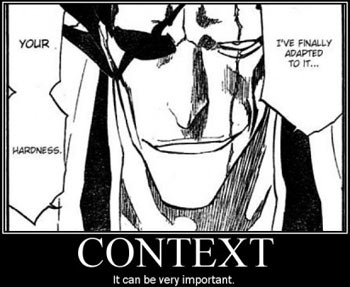I Haz A Flavor: Context
Published on May 30th, 2010 in: Culture Shock, Media, Music, Over the Gadfly's Nest |By Matt Keeley

Not too long ago, I read an essay about context in journalism from Terry Heaton’s PoMo Blog. It’s very much in the same vein as the Popshifter Manifesto and the Anti-Snark Manifesto that launched The Believer.
There’s something to be said for this, particularly when there seems to be so much criticism in criticism. It’s not necessarily a bad thing, but it often seems less like helpful guidance and more like hobby-horsing.
For example, writer Ed Champion cobbles together New York Times critic Michiko Kakutani’s reviews over the past year to find that 48.1% are negative. I’ve never been a fan of Kakutani—mostly for her seemingly inexplicable hatred of David Foster Wallace—but other reviews she done of books I know seem to run wholly counter to my experiences with them.
Of course, Terry Heaton’s original piece is more about true journalism and context, or rather an understanding of the full story, something sadly lacking in a lot of journalism. This is why The Daily Show is so many people’s News Outlet Of Choice; they actually do the digging to provide context.
The economic crisis is a great example of this. For the longest time, even though it was happening, I didn’t quite get WHAT was happening, other than that we’re all poor and/or fired now. But some of Jon Stewart’s interviews with people who KNOW this stuff helped me understand what was going on. I might not be an expert on it, but I at least was able to put the pieces together to give me a working knowledge of what happened.
And why does The Daily Show do this when so many other TV news programs don’t? It’s because The Daily Show does what other shows do not. Not only will Jon Stewart devote half the show to a topic sometimes, often the interviews are much longer than what can air, so The Daily Show puts the full interview online for those who care.
The funny thing is that a “fake” news show does that, when “real” news shows don’t, and it’s because it runs against the ideas of what’s “good” TV news. The prevailing idea has been that people get the quick-hits on TV and if they want depth, they’ll go to the newspaper. But funny thing that: the newspapers aren’t exactly doing that well now, and in fact, the ones that still exist have had to rely on smaller and smaller staffs, or even going to almost all wire-service stories. Without full staffing at newspapers, it’s nigh-impossible to go in depth anymore—meaning again, quick-hit news.
Coupled with the fact that in the 1980s and 1990s, instead of being loss-leaders that make up in prestige what they lose in dollars, TV network news departments were combined into the rest of the programming departments, meaning news was also required to turn a profit. It’s hard convincing someone that you can turn a profit running an explanation of the mortgage crisis thoroughly, particularly if that person you’re convincing works in the entertainment side of things and is looking for some explosions or cleavage to jazz it up.
Pages: 1 2
One Response to “I Haz A Flavor: Context”
June 1st, 2010 at 7:00 pm
Welcome to flavor country, where there’s a new one every week. Great thinky piece!
Time limit is exhausted. Please reload the CAPTCHA.